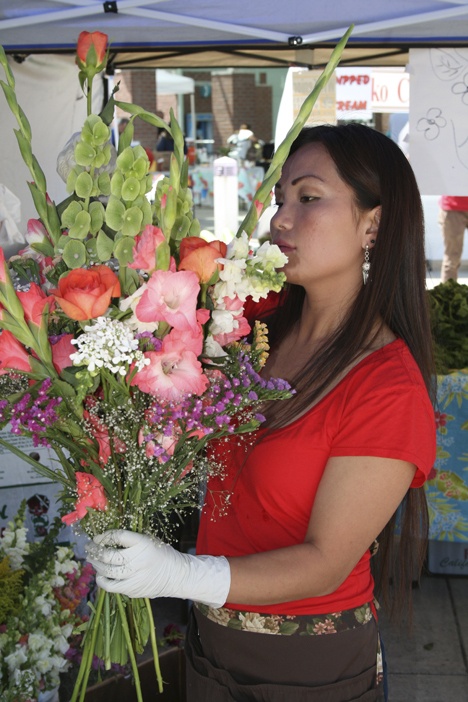Lillie Brinker just couldn’t resist drawing an agricultural analogy.
“I planted a seed, but I need to cultivate that seed and see it grow,” said the first-year manager of the Auburn International Farmers Market. “I want to spread the word … to get every person in Auburn to know about the market. I would like to continue our grassroots outreach to the community and say, ‘Hey, we’re out there.’ “
So far, the reviews have been favorable for the downtown market in its inaugural season under Brinker’s watch. The city-supported market, which opened to a bustling crowd 16 weeks ago, officially concludes its successful run Sunday at its familiar spot, the Auburn Transit Center Plaza.
After several failed efforts to launch and maintain a farmers market in past years, Auburn’s latest enterprise has taken root and looks to stick around – with city backing and funding assistance from the King County Conservation District.
Auburn City Councilman Bill Peloza, one of the forces behind the market’s return to the community, looks at the numbers and sees nothing but green fields and sunny skies.
Gross sales from vendors – everything from farmers’ produce to crafts – ranged from $9-15,000 on Sundays. The number of weekly participating vendors has ranged from 28 to 46, an average of between 32 and 35 suppliers, Brinker said.
The potential is there. Opening day pulled in a crowd of 2,300, generating $14,000 in gross sales.
The four-hour Sunday market typically has attracted anywhere from 800 to 1,000 customers depending on weather, holidays and other influences.
Taking into account the sour economy and changes to the downtown climate in terms of business turnover and redevelopment, those are good numbers.
Peloza says the market’s financial performance out of the box was an “outstanding success,” adding that the city is not in the business for profit but to cover operational costs.
So far, the market has been doing that.
“From the get-go, I figured that if we put a farmers market in this city, people would come,” Peloza said. “I never felt it would be huge, but I figured it would be good attendance. This city was yearning for activity, and having it in a beautiful plaza with all the surrounding (vendors and businesses) made it a natural.”
As Auburn continues its transition, sales will continue to be a challenge. But the farmers market is an effort to trigger interest, rally support, gather local sellers, as well as feed and educate consumers.
The most common complaint from customers has been the market’s higher prices. Brinker acknowledges that and hopes those prices eventually will fall in line with competitors as the market continues to gain acceptance and strength.
“There’s convenience and there’s benefits from a farmers market,” Brinker said.
Peloza said that while some market produce might be priced higher, other items are actually a bargain.
“You’re going to pay more for farm-fresh produce, something that’s just been pulled from the ground that morning … rather than getting a strawberry from California that’s a week or two weeks old,” he said. “The (market) quality is better, fresher.”
The AIFM intends to follow its own steps and become a socio-economic happening. On a given Sunday, the market features approximately 40 vendors selling seasonal produce, cut flowers and crafts along with a variety of cooking demonstrations, children’s activities, educational workshops and entertainment. The market’s intent is to pull farmers and vendors from the greater Auburn valley.
On Sunday, the market will close by offering a diverse lineup – masters gardeners, craft-making, song and dance and of course, food.
Brinker, who has a significant background in event planning, believes the hard work has paid off.
“The community has just amazed me,” said Brinker, who came to Auburn after previously working as the manager of the Kent Farmers Market. “With a new market you never know how it’s going to be received. … But it has gone well. It was the right time, the right place and the right location.
“And it’s the small business owner who is trying to bring new life to downtown,” Brinker added. “People are coming back.”
Brinker said the market is trying to reach out to a wider cross-section of people, both young and old, rich and poor.
Changes are in store for next year. The market season might go longer, perhaps into October, and open up earlier on Sunday mornings. Other improvements are on the agenda. The goal is to reach more people in more ways, especially families of all origins.
The first season has been one under the sun for Brinker and vendors.
“I’m just overwhelmed by how the community has responded,” Brinker said. “I couldn’t have asked for a better season.”
====
Market’s closing day
• What: Auburn International Farmers Market final day of the season
• When: Sunday, 11 a.m. to 3 p.m.
• Where: Auburn Transit Center Plaza, 23 A St. SW, Auburn. Admission free.
• On sale: Farm fresh produce, cut flowers, other food favorites, including gourmet pasta.
• Appearances: Master gardeners. Covington’s Happy Mountain Farm will bring a cow. The Auburn Children’s Dance Theater and the Sudanese Dancers and Drummers will perform. Face-painting, live basket weaving and other activities will be available.
• Information: 253-266-2726, www.auburnfarmersmarket.org



